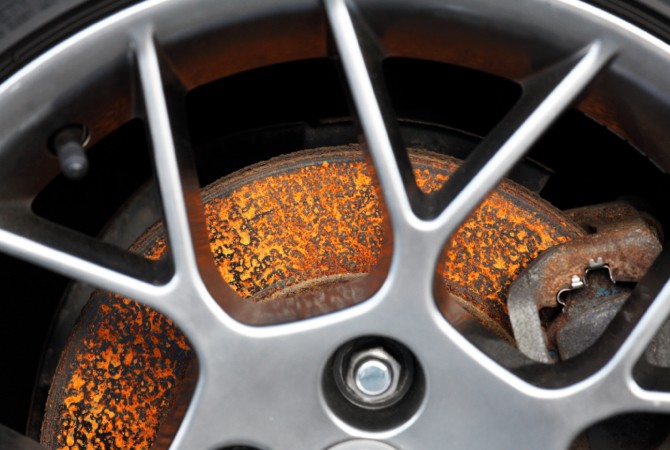Does Rain Cause Rust on Cars
Rain can accelerate rust formation on cars by promoting oxidation of metal surfaces. However, proper maintenance can prevent this issue.
Rust on cars is a common concern for vehicle owners, especially in regions with frequent rain. The reason rainfall contributes to rust is due to water acting as a catalyst for oxidation, which deteriorates the metal surfaces of cars over time.
Without protective measures like regular washing and waxing, rainwater can lead to the formation of rust spots that not only affect the appearance but also the structural integrity of the vehicle. Understanding the impact of rain on rust formation is essential for maintaining the longevity and aesthetics of your car. By implementing preventative measures and performing routine inspections, you can effectively combat the damaging effects of rain-induced rust.
Credit: www.businessinsider.com
Factors That Cause Rust On Cars
Rust on cars is mainly caused by a combination of moisture and oxygen, which accelerates the metal corrosion process. Rainwater facilitates rust formation by creating a damp environment that leads to oxidation and eventual deterioration of the car’s metal surfaces.
Routine maintenance and protective coatings can help prevent rust caused by rain on cars.
Factors that cause rust on cars can vary, but a primary factor is moisture. When rainwater or condensation accumulates on the surface of a car, it creates the ideal environment for rust formation. The combination of moisture and oxygen initiates the oxidation process, leading to rust.Moisture
Moisture is a key contributor to car rust. When rainwater sits on a car’s surface, it accelerates the formation of rust. Even small crevices or scratches can trap moisture, enabling the rusting process to begin. It’s important to promptly dry any wet areas to prevent rust from developing. Another significant factor that contributes to car rust is salt. In regions where roads are salted during winter, cars are particularly susceptible to rust. Salt acts as a catalyst, accelerating the oxidation process and causing metal to corrode. This process is further exacerbated when saltwater splashes onto the car’s surface.Salt
Salt is a potent catalyst for rust formation, especially in regions where roads are regularly salted during winter. When salt accumulates on a vehicle, it significantly accelerates the rusting process. The combination of salt, moisture, and oxygen creates an environment conducive to rust formation, leading to corrosion. In conclusion, moisture and salt are significant factors that contribute to car rust. It’s essential for car owners to mitigate these factors by promptly drying wet areas and ensuring thorough cleaning, particularly in regions where salt is used on roads. Taking proactive measures can help protect cars from rust and extend their lifespan. It is vital to ensure that the car is well-maintained to prevent the formation of rust, which can significantly prolong its lifespan and maintain its value. Regular washing and application of protective coatings can help mitigate the impact of moisture and salt, preserving the car’s exterior.
Credit: www.cochran.com
Protecting Your Car From Rust
Prevent rust on your car caused by rain with regular waxing and washing. Ensure to keep the undercarriage clean and apply rust protection products to fend off moisture. Maintaining a protective barrier will safeguard your car’s exterior from the corrosive effects of rain.
Washing And Waxing
Regularly washing and waxing your car forms a protective barrier against rust-causing elements like rain and moisture.
Undercoating
Undercoating provides an extra layer of protection against rust by shielding the undercarriage of your vehicle.
Protecting your car from rust is crucial to maintain its appearance and longevity. Rain can accelerate rust formation on vehicles, but there are preventive measures you can take.
Investing time and effort in proper maintenance can prevent rust from taking over your vehicle.

Credit: www.wagnerbrake.com
Frequently Asked Questions On Does Rain Cause Rust On Cars
Is It Bad For Your Car To Get Rained On?
Rain does not damage your car, but it can cause some issues if not properly taken care of. Heavy rain can corrode the car’s metal parts. To protect your car, regularly check for rust and apply a protective wax coating.
Clean the car after rain to prevent water spots and maintain its appearance.
Can Rain Water Cause Rust?
Yes, rainwater can cause rust as it contains oxygen and carbon dioxide that react with metal, promoting oxidation.
Do Cars Rust From Water?
Yes, cars can rust from water exposure to metal components, especially in areas with high humidity or salt on roads. Preventive measures like regular washing and waxing can help protect the car from rust.
Should I Wash My Car If It’s Going To Rain?
Yes, washing your car before rain can prevent dirt buildup and water spots on the finish.
Does Rain Cause Rust On Cars?
Rain can contribute to the formation of rust on cars, especially if the vehicle’s metal surfaces are exposed and not properly protected.
How Does Rain Contribute To Rust On Cars?
When rainwater comes into contact with bare metal surfaces on a car, it can create a moisture-rich environment that accelerates the rusting process.
What Parts Of A Car Are Most Susceptible To Rust In The Rain?
Areas of a car that are prone to rust in rainy conditions include the undercarriage, wheel wells, door panels, and any other exposed metal components.
Conclusion
Rain can contribute to car rust due to its corrosive properties. Understanding this can help car owners take preventive measures and protect their vehicles. Regular maintenance and protective coatings can help mitigate the effects of rain on cars. By staying informed and proactive, car owners can prolong the life and appearance of their vehicles.

